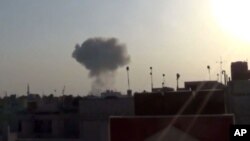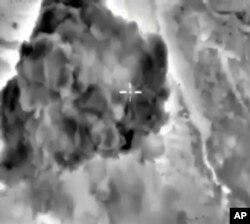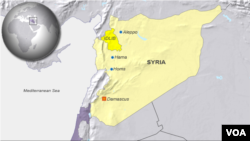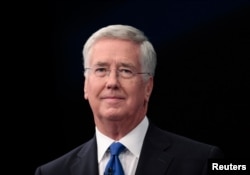Russian officials said they have carried out 60 airstrikes on Islamic State extremists since launching their air campaign last week, but Syrian activists and insurgent commanders say moderate rebel factions continue to be the primary targets four days into Moscow’s air campaign.
Turkey’s leader has joined a chorus of Western leaders demanding that Moscow cease its attacks on the Syrian opposition and focus solely on fighting the Islamic State group.
Turkish President Recep Tayyip Erdoğan said in a television interview that the Russian airstrikes were targeting moderate opposition forces.
Erdoğan said most of the strikes are focused on “Hama, Homs and Aleppo” and against groups that have “been resisting the regime” of Syrian President Bashar al-Assad.
“Why is Russia so interested in Syria? I want to understand this," he said. "Russia has no border with Syria, but I have a 911-kilometer-long border. I am disturbed with what is happening now."
Russia: IS is target
Russian officials, though, insist they are targeting the Islamic State group, and Andrei Kartapolov, a spokesman for the Russian army's general staff, said in a briefing Saturday in Moscow that Russian warplanes had struck more than 50 Islamic State targets in the previous 72 hours, including dropping a bunker-busting air bomb on an underground command post and storage facility near Raqqa, the terror group’s de facto capital in Syria.
“We will not only continue strikes, we will also increase their intensity," Kartapolov told reporters.
He said Russia had warned the United States to stop its own flights in areas where Russia's air force was operating.
Residents in the coastal province reported over the weekend that Russian warplanes -- Su-24s, 25s and 35s -- were roaring off almost around the clock from the Bassel al-Assad air base, named after the elder brother of Syrian President Assad, and heading north and east.
Kremlin-controlled media outlets, such as Russia Today, focused their news reports Sunday almost solely on videos released by the Russian Defense Ministry of the strike near Raqqa, claiming that Moscow’s intervention was sowing panic in the ranks of Islamic extremists.
The Russian outlets poured scorn on Western claims that rebel militias, some U.S.-backed, were more the targets of Russia’s airstrikes than Islamic State extremists.
Syrian monitoring group
The London-based pro-rebel Syrian monitoring group, the Syrian Observatory for Human Rights, which has been critical of the Russian intervention, confirmed that there were “several Russian strikes on IS positions west of Raqqa” overnight Saturday.
But on Sunday, monitoring groups including the Syrian Observatory and rebel commanders reported that Russian warplanes carried out several bombing runs on the city of Idlib, which is held by Islamist militias and al-Qaida affiliate Jabhat al-Nusra, who have been not only battling the government of President Assad but also the Islamic State group.
In Idlib province Russian warplanes also hit a training camp and weapons depot in Maarat al-Numaan as well as weapons and ammunitions stores in Jisr al-Shughour, according to Syrian rebel commanders.
There were also reports Sunday of Russian airstrikes in the northern countryside of Hama province on the villages of Tal Waset, al-Ziyara and Sahl al-Ghab -- again territory controlled by non-Islamic State rebel militias.
Command center destroyed
A Syrian military source, quoted by Syria’s state media, said Russian and Syrian planes destroyed a command center in Latamneh, in Hama province, where Western-backed rebels operate.
British Defense Minister Michael Fallon said Sunday that only one in 20 Russian airstrikes in Syria were aimed at the hardline Islamic State forces.
Fallon accused Russia of dropping unguided munitions -- so-called “dumb bombs” on civilian areas, and against Western and Gulf-backed militias seeking to oust Assad.
"We're analyzing where the strikes are going every morning. The vast majority are not against IS at all," he said. "Our evidence indicates they are dropping unguided munitions in civilian areas, killing civilians, and they are dropping them against the Free Syrian forces fighting Assad.”
British Prime Minister David Cameron accused Russian forces in a speech Saturday of not discriminating between moderate and Islamist rebels fighting Assad and the jihadists of the Islamic State. “As a result, they are actually backing the butcher Assad and helping him and really making the situation worse.”
Defend airstrikes
Dmitry Peskov, Russian President Vladimir Putin's spokesman, dismissed Western criticism at the weekend, saying at first in an interview with Russia 24 TV that the reports of bombing runs on moderate rebels were just “false rumors,” and then arguing there is no difference between rebel militias and Islamic State fighters.
“No one can explain till now what is the meaning of the moderate opposition,” Peskov said.
With the Russian airstrikes intensifying, analysts are now warning that Gulf states and Turkey are likely to respond by increasing their support of rebel groups in Syria with more arms supplies and possibly shoulder-fired ground-to-air missiles, or MANPADS, able to down Russian jets and helicopters.
The threat of escalation is creating “a really seriously dangerous situation on the ground,” said General Simon Mayall, an adviser to the British government.







